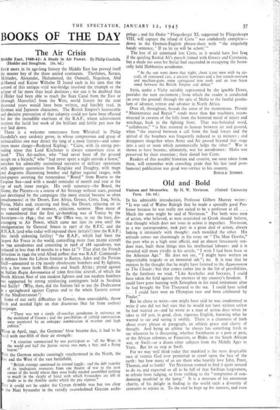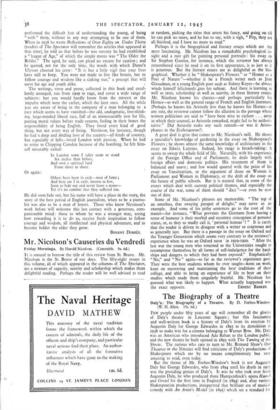Old and - Bold
IN his admirable introduction, Professor Gilbert Murray writes: " It was said of Walter Raleigh that he made a specially good Pro- fessor because he was really not suited to be a professor at all. . . . Much the same might be said of Nevinson." For both were men of action, who believed, as men nourished on Greek should believe, that thought which does not issue in action is imperfect. Nevinson, as a war correspondent, took part in a great deal of action, always linking it intimately with thought: each moulded the other. His attitude comes out charmingly in his essay on " The Man Goethe," the poet who as a high state official, and an almost ferociously out- door man, built these things into his intellectual labours: and it is revealed still more vividly in his article, " I wish I had been born in the Athenian Age." He does not say, " I might have written an imperishable tragedy or an immortal ode "; no. It is true that he rejoices in the thought that he might have listened to the Agamemnon or The Clouds ; but that comes rather late in the list of possibilities. In the forefront we read, " Like Aeschylus and Socrates, I could have taken the field against the enemies of my country's freedom. I could have gone hunting with Xenophon in his rural retirement after he had brought the Ten Thousand to the sea. I could have sailed . . . I could have won an Olympian race and been celebrated by Pindar."
But he chose to write—one might have said he was condemned to write if one did not feel sure that he would not have written unless he had wanted co--and 'he wrote as a man of action does when he takes to tI4 pen, in good, clear, vigorous English, knowing what he wanted to say and saying it swiftly. There is a cleanness of limb about every phrase or paragraph, an athletic grace and clarity of thought. And being an athlete he always has something fresh to say whatever he is discussing, whether Swinburne as a poet of pain, or the African colonies, or Futurism, or Blake, or the South African war, or Swift—or a dozen other subjects from the Middle Ages to Yeats. But let us stop at Swift.
For we may well think today that mankind is the most despicable race of vermin God ever permitted to crawl upon the face of the earth: but how many of us are there who heartily love John, Peter, Thomas, and so forth? Yet Nevinson seemed to find it quite natural to do so, and expected us all to be full of that Swiftian forgiveness, to refrain from judging, or from yielding to the " temptation of con- demning mankind in the lump." It is a measure of his enormous charity, of his delight in finding in the world such a diversity of creatures to rejoice at. To the end he kept up his interest, and even performed the difficult feat of understanding the young, of being " with " therp, without in any way attempting to be one of them. When in 1938 he wrote Reflections of Over Eighty on Under Thirty (readers of The Spectator will remember the articles that appeared at that time), he told us that before he was seventy he had established a " league of Age," of which the simple motto was " The Older the Bolder." The aged, he said, can plead no excuse for caution ; and he quoted, not for the only time, the words with which Dante's Ulysses cheered his crew : " It is but a little vigil that your lives have still to keep. You were not made to live like brutes, but to follow courage and wisdom like a sinking star," a precept that will serve for age and youth alike.
The writings, verse and prose, collected in this book and excel- lently arranged, run from 1909 to 1941, and cover a wide range of subjects : but you would hardly know from the interest or the impulse which were the earlier, which the later ones. All the while you are aware of being in the company of a man belonging to a race which seems to have vanished—the old, undogmatic, free-think- ing, large-minded liberal race, full of an immeasurable zest for life, putting moral values before trade returns, feeling in their bones the responsibility of being English. They loved every kind of good thing, but not every way of living. Nevinson, for instance, though he had a deep and abiding love of the country—all kinds of country, but especially of hills—loved London with passion. When he had to retire to Chipping Camden because of the bombing, he felt him- self miserably exiled: In London town I taller seem to stand Six inches than before, And own a spiritual land From shore to shore.
Or again : Others have been in exile—men of fame ; And here am I in exile, known to few, Soon to fadeout and never leave a name— Yet it's no comfort that they suffered too.
He did soon fade out, but his name will have a place in the story, the story of the best period of English journalism, when to be a journa- list was also -to be a man of letters. Those who knew Nevinson's work before will welcome this last contact with a generous, com- panionable mind: those to whom he was a stranger may, seeing how rewarding it is to do so, receive fresh inspiration to follow courage and wisdom, all intellectual and physical adventure, and to become bolder the older they grow.
BONAMY DOBRiE.























 Previous page
Previous page